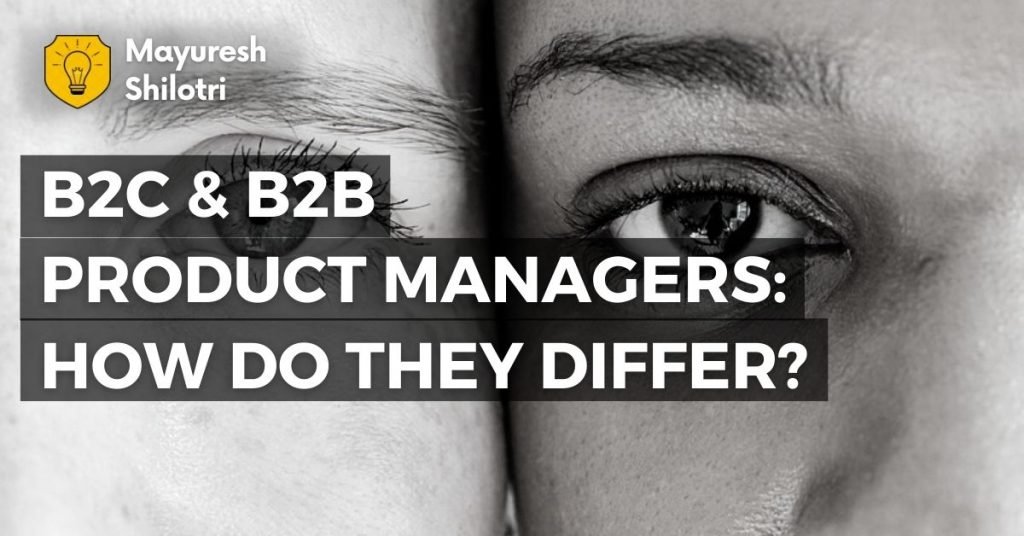The challenges of a B2B product manager vs a B2C product manager are almost similar. Having had the privilege to be a part of both, i.e., a B2B and B2C domain, the differences were quite out in the open.
A Product Manager in B2B vs B2C is different. The B2B PMs are industry experts and deal with clients with certain expectations and demands. A B2C PM, on the contrary, focuses on the individual buyer persona and deals with a much large user domain.
- Words:1047(Skim friendly)
- Type: Post
- Video:0
- Slides: 1
- Topic: Humans Of EdTech
- TIME: 16 Minute
Knowing the Background
As a product manager, the responsibility is to choose the strategy that works best for a product. Product management is all about maintaining the right balance between the audience and iteration.
Considering assumptions, it is often said that B2B companies need to acquire knowledge from B2C counterparts. Where engaging more potential buyers and generating more customers is concerned, it is often said that B2B should follow B2C.
Before we get into the broad level of differences between the two, let’s get to know B2B and B2C better.
Understanding B2B Product Management
B2B product management involves working closely with clients who own or possess other businesses. The daily tasks and responsibilities of a B2B product manager include:
- Branding
- Pricing
- Market Research
B2B previously meant that user experience is not as important. Ideally, the buyer should end up buying the product, and that is it. B2B took over recently, and the focus was intended to incorporate function over form.
UI and user experiences took a backseat compared to product features. Thankfully, recent trends are changing this approach using Vertical SaaS and Product Led Growth. Companies are also changing their approach and mechanism.
Understanding B2C Product Management?
The B2C product management is all about ensuring the customer experience, collecting their feedback, and making the necessary modifications.
This is the job of product managers as they are the ones responsible for holding market research, conducting in-person interviews, and working on feedback. Thus, this creates a direct bridge between the company and the users.
Any company that interacts directly with its customers always has the upper hand. This gives the company to develop and update products based on the requirements of the end customer. As a result, the retention of users sees a dynamic growth, and they will continue using the products for a longer time.
B2B vs. B2C - Let’s Get This Sorted
Technically, B2B and B2C are both companies that aim to design their products and sell them. However, many things are different if you look at the back end. Let’s drill down to the differences.
1. The “Business Model”
The business model of B2C and B2B products vary.
The B2C model generates revenues from customers who are using the platform and making trillion transactions every day. The transactions could be in any form, i.e., a subscription or purchase.
This is the process for B2C to make numbers. Depending on how progressive a business is, the customers are the ones who generate the maximum revenue.
The B2B model, on the other hand, yields revenue from the available large enterprise contracts. There could be numerous contracts that flow in, but the one creating annual contracts will end up retrieving the maximum benefit. Having customers by a negligible amount could affect product dynamics in the long run.
2. Product Metrics
The product managers of B2B and B2C have to be equally attentive to their losing customers. But the B2C sector has got to worry more about it as they deal mostly with customers.
For B2C companies, it is not something exemplary to see the reflux of a humongous number of customers. However, for a B2B, this will be extremely important. So, as a product manager, what exactly is different between B2B and B2C?
The capability of maintaining the customers who can let go of you and your company as it deems fit to them. Customer retention and loyalty is currently the biggest priority they have to keep in mind.
3. Customer Issues
To phrase it better, product management is all about solving the problems of the end customers. It is possible for Good PMs to quickly analyze what they are building, how they are building it, and why they are building it.
However, for B2B, this could come off as a real struggle. This is because Enterprise Users can’t be compared to Enterprise Customers.
To help with the terms, let’s put it this way:
- Customers are the ones who are suffering the most but are eventually going to buy your products.
- Users are making maximum use of your product regularly.
B2C companies, since they are dealing with customers constantly, and it is often easy for the product managers here to slide through.
4. Revenue
In B2B, revenue comes off when transactions are made via enterprises. In B2B, the typical sales cycle can stretch from 6 to 12 months. During this cycle, it is the core responsibility of the sales team to construct relationships with their customer. Also, they need to make sure that the customer sticks around for the longest.
For B2C, revenue piles up mainly from customers, whether new or regular. These customers make transactions on a daily basis. These transactions are made in multiple formats. Netflix charges a minimal amount for a monthly subscription, but with its millions of active users, B2C companies make money.
For product managers in B2B companies, this could be real trouble.
5. Functional Significance
For instance, you have an urgent meeting where you need to present the customer data for the past 5 years. Although you had been ready for the presentation, something goes wrong during the actual presentation, which forbids you to move to the next slides.
Also, there is no backup. Could you understand the situation you are in?
This is, again, one of the major differences between B2B and B2C. The dependency of the users and how easily the task is completed. In B2B products, any features that demand more time and effort will only add up to the existing issues of the PM.
Conclusion
The product managers in B2B and B2C need a refined skillset, perception, and mindset that stretches to the product. So, we should consider the same and look at them from a different lens.
Join to get sneak peek into what's happening
I write about books, experiences, product, UX, EdTech, early stage growth, validation – mostly tech. Subscribe if these topics interest you. Once every 15 days emailer. I promise – No spam. (I am known for it otherwise) 😉




